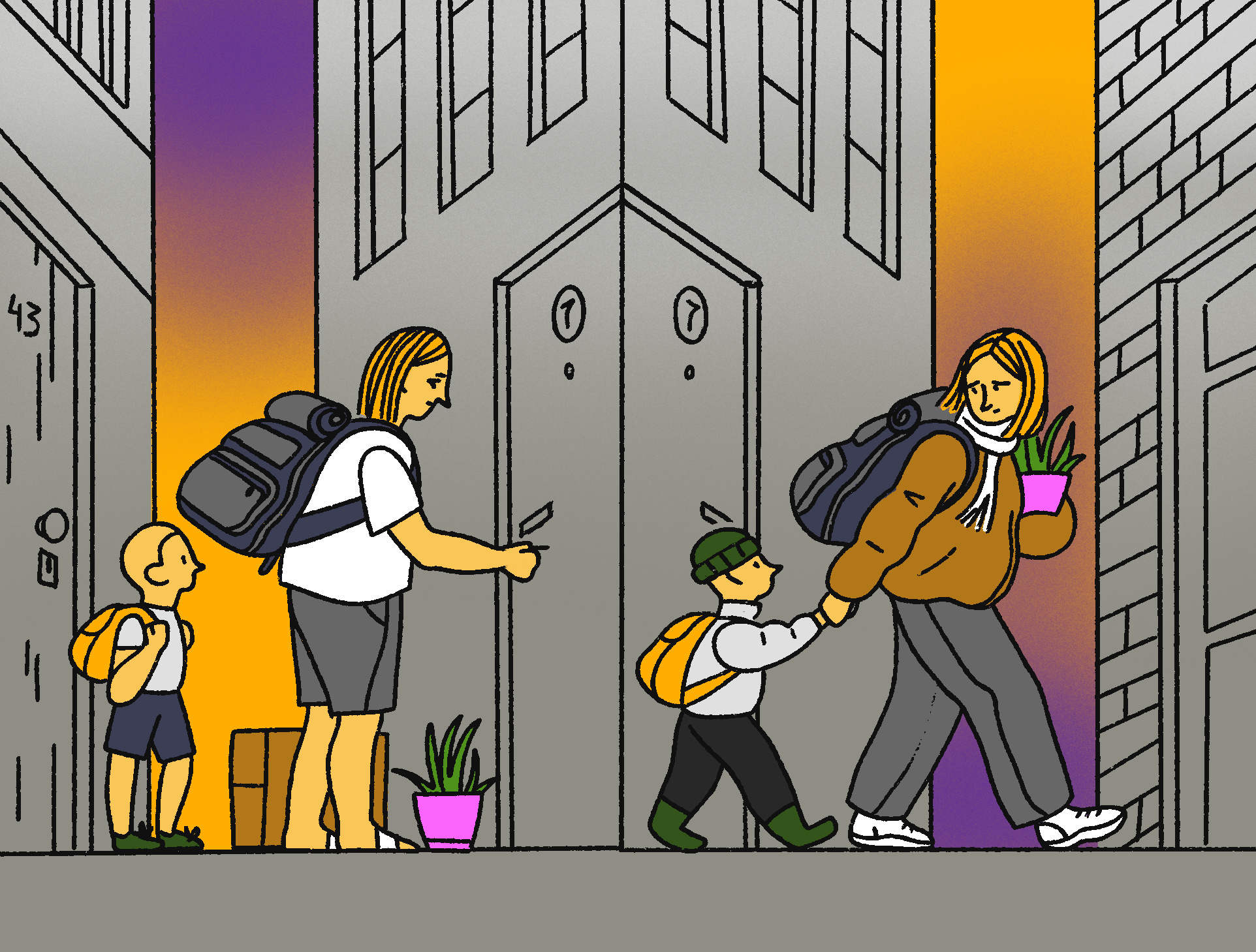
Introduction
Renting a home in Ukraine is mostly unpredictable and insecure today. Russia’s full-scale invasion has only exacerbated this problem and made the need for affordable and proper-quality housing more urgent. About 4.6 million people have been forced to leave their homes. For a significant portion of them, rental housing has become their home. However, this type of housing cannot always guarantee comfort and confidence. As demand for rental housing spikes, its prices rise as well, and therefore it becomes less affordable, especially for internally displaced people.
There is a need for a complex and human-centric housing policy to address the existing challenges. In order to develop and implement these solutions, we need to collect and analyse data on what the rental sector is like in Ukraine and what the experiences of tenants are like. In the past three years, in response to the housing crisis exacerbated by the war, a number of programs and projects have been launched to assist with housing provision. It is important to analyze and evaluate these programs and projects, collect data on their results, and systemize the experience gained from them.
This report presents information on the Ukrainian rental housing sector, the experience of renting among internally displaced people, and data on the implementation of the experimental rental housing financial assistance program for internally displaced people, launched in late January 2025. The key purpose of this research is to promote evidence-based solutions in housing policy.
The report continues Cedos’s years-long work on researching the housing sector in Ukraine. Earlier, we published the survey findings on housing and the residential conditions of Ukrainians, which considered, in particular, access to housing, tenure structures, and the population’s vulnerability to the loss of housing. In addition, the report reviewed the current state, challenges, and new housing policy principles in Ukraine, and considered ways to create affordable, high-quality, and secure housing for everyone who needed it. The Cedos team researched the existing social, temporary, and crisis housing in Ukraine and considered the prospects of developing such housing in the Kalush Hromada. We analyzed housing needs in specific regions, particularly in rural hromadas near the frontline. In addition, in 2022, Cedos published the first Legal Guide to Renting Housing in Ukraine. This study continues our previous work and focuses on the private rental housing sector as well as attempts to improve its accessibility using a housing rent subsidy for IDPs.
The report consists of four thematic parts. First, we review the current state and challenges in the private rental housing sector in Ukraine, particularly by analyzing the problems and causes that have led to these challenges. Then we focus on the renting experience of internally displaced people, describing the experience based on focus group discussions. In the third part, we analyze the rent subsidy program for internally displaced people, particularly by providing an overview of the program, its results, and the difficulties that have emerged in the process of its implementation. Finally, we analyze secondary data related to the international experience of policies that aim to improve the access to and security of rental housing. At the end of the report, we summarize the findings and provide recommendations for state government bodies, international and non-governmental organizations that work with the housing sector in Ukraine.
Conclusions
The key issues of the private rental sector in Ukraine are still its informality, unpredictability, and lack of security. Rental housing is regulated by specific articles of the Civil Code and the Constitution. However, there is no dedicated legislation governing rental housing in Ukraine. Certain matters related to renting, such as the mechanism for setting and increasing rent or the minimum duration of leases, remain unaddressed by law. These matters are left for the parties to regulate through the lease.
According to expert estimates, most landlords are private individuals who rent out housing informally, sometimes without signing a contract and usually without paying taxes. At the same time, even the presence of a written lease does not always guarantee the protection of rights. As a result, tenants often face violations such as forced eviction, non-return of security deposits, sudden rent increases, biased treatment, and discrimination. This is partly due to the limited scope of existing regulations and of their enforcement. Furthermore, court practice in protecting tenants’ rights currently remains minimal. The implementation of existing regulations is also hindered by the lack of formalization in the rental sector.
Another challenge of the private rental sector is the lack of formalization of intermediary activities. This complicates oversight and control of the private rental sector, as well as the collection and analysis of information on rental housing.
Informality and the lack of adequate protection in the private rental sector negatively affect various stakeholders, including property owners and real estate agents. However, tenants remain the most vulnerable group, particularly young people, low-income people, elderly people, and internally displaced people.
In this study, we focused on the renting experiences of internally displaced people and were able to identify several key challenges they face: the deterioration of housing conditions after forced displacement, the lack of affordable housing, the unpredictability and insecurity of renting housing, prejudice and discrimination.
The deterioration of housing conditions and financial situations after forced displacement is one of the major issues mentioned by the informants. Most study participants had lived in their own housing, an apartment or a private house, before displacement. Accordingly, a significant portion of participants encountered rental housing for the first time after being displaced. They emphasized that the rental housing rarely meets their previous standards, but it is perceived as a necessary compromise.
Internally displaced people said they perceived renting as a forced measure. This is linked to a sense of insecurity and dependence on the unilateral decisions of the landlord. In addition, frequent relocations caused by sudden rent increases or evictions made life more difficult for families of internally displaced people, particularly due to the need to change their children’s schools, the lack of transit access, or the lack of adequate infrastructure in their new place of residence.
The inaccessibility of rental housing was a persistent problem for internally displaced people. It made finding housing more difficult and led to situations where people rented lower-quality housing or where several generations of the same family were forced to live together.
Another issue with renting housing from private individuals, noted by nearly all informants, was its unpredictability. The study participants described a number of common difficulties they faced due to the lack of control over the rental sector and the absence of accessible ways to protect their rights. These included landlords’ reluctance to rent to internally displaced people or offers to sign rental contracts for no longer than 6 months, as well as unilateral sharp rent increases that could be accompanied by threats of eviction.
The experiences of internally displaced people confirm the existence of inequality in the relationships between tenants and landlords. The housing situation of internally displaced people often depends on the nature of their interaction with landlords. Rental relations are sometimes based on verbal, non-formalized agreements rather than written leases. On the one hand, some study participants reported cases of support and flexibility from landlords: they did not raise the rent, respected privacy, approved renovations, and covered their costs through rent. On the other hand, some tenants faced negative practices: unjustified rent increases, the need to resolve maintenance issues at their own expense, and so on.
The study participants who lived in collective sites spoke about both the positive and negative aspects of living there. On the one hand, informants noted the accessibility of collective sites, the absence of discrimination based on IDP status or on the presence of children or pets, as well as the availability of functional household appliances and adequate heating in winter. On the other hand, internally displaced people mentioned the lack of space, the need to live with strangers, and to share kitchens, bathrooms, and access to washing machines with them. Although informants described living in such conditions as emotionally exhausting, the reliability and security of this option compared to rental housing motivated IDPs to remain in the collective sites.
Some informants said that moving into their own housing was their most desired option. According to them, it would allow them to improve their living conditions and regain control over their lives and a sense of “normalcy.” A few study participants also expressed hope for compensation programs for damaged and destroyed housing, as well as mentioned social housing as a possible long-term solution.
In this study, we also analyzed the implementation of the experimental housing rent financial assistance project for internally displaced people, which was launched in late January 2025.
The experimental project providing rental housing subsidies showed limited results. As of early September, according to the Pension Fund, 184 applications for the subsidy had been submitted, resulting in 86 subsidies granted. These outcomes of the experimental housing project can be attributed to several factors. First of all, the current state of the private rental sector in Ukraine does not support the effective implementation of such programs.
One of the main challenges faced by those who implemented the program was landlords’ reluctance to participate. Primarily, given the growing demand for rental housing, landlords could prefer tenants who are able to pay for housing without assistance programs. In addition, as mentioned above, in most cases landlords in Ukraine are private individuals who rent out housing informally, without formal leases or tax payments. Under these conditions, tax compensation alone is not an effective incentive to participate in the program. The landlords whom we talked to as part of this study did not mention tax compensation as a factor that could motivate them to take part in the program. Thus, the proposed tax relief largely failed to increase the program’s appeal due to the lack of simultaneous strengthening of tax control.
Internally displaced persons expressed distrust toward the program; their concerns related both to its stability and its duration. A few informants living in collective sites said they feared losing their current place of residence due to participation in the new project.
Internally displaced people voiced concerns about the program’s future duration and possible payment delays. They referred to negative experiences with previous housing programs. They also expressed doubts about their ability to convince landlords to rent housing to people paying for it through a subsidy.
The design of the experimental project at times made it difficult for internally displaced people to participate. For instance, to take part in the subsidy program, IDPs had to give up or forgo receiving living assistance. Accordingly, some informants stated that they opted for living assistance instead, as they considered it a more reliable program. The requirement that all household members capable of working be employed or registered with the State Employment Service was another obstacle mentioned by informants.
Finally, representatives of the non-governmental sector noted that introducing a subsidy in an unregulated rental market could lead to an increase in rent prices. Some housing experts pointed out that it would be more reasonable to invest limited financial resources in expanding the social housing stock and only then implement subsidy programs for those unable to pay the full rent.
Rental housing, particularly strengthening its security and predictability, should become one of the priority directions of housing policy development in Ukraine. There is currently a need to balance the relationship between tenants and landlords by strengthening the protection of tenants’ rights. Only under such conditions can renting from private individuals serve as a reliable means of ensuring the right to housing.
Recommendations
- Develop and adopt a State Housing Policy Strategy.
- Develop and adopt a section on rental housing and protecting tenants’ and landlords’ rights as part of the State Housing Policy Strategy.
- Develop and adopt dedicated legislation on rental housing.
- Amend tax legislation to introduce differentiated tax rates for short-term and long-term rental housing.
- Establish caps on annual rent increases within one lease at no more than, for example, 10% of the rent specified in the lease at the moment of its signing.
- Establish the minimum duration of long-term leases—for example, 3 years.
- Introduce registration of housing leases. Registration of leases can be done through digital instruments, such as the Diia platform. The registration procedure and the obtained data may become part of the future Unified Housing Information and Analysis System, whose establishment is already envisioned by the Bill “On the foundations of housing policy.”
- Introduce the institution of a Housing Ombudsman, whose powers may include: reviewing and verifying complaints; monitoring, documenting, and publicizing violations of the right to housing; obtaining information from government bodies, including information with restricted access; submitting requests to government bodies and law enforcement agencies regarding identified violations of legislation regulating access to housing; unrestricted access to government bodies and social housing operators, participation in meetings on the implementation of the right to housing; providing consultations on the protection of housing rights; analyzing compliance with housing legislation and making proposals for its improvement; representing interests in court.
- Strengthen tax control over private rental housing transactions.
- Regulate the activities of intermediaries in the private rental sector, including by developing and adopting dedicated legislation on intermediary activities.
- Promote awareness of rights and responsibilities in the private rental sector through information campaigns.
- Conduct regular monitoring studies on housing conditions in the private rental sector, particularly regarding the quality of and access to such housing.
Support Cedos
During the war in Ukraine, we collect and analyse data on its impact on Ukrainian society, especially housing, education, social protection, and migration















